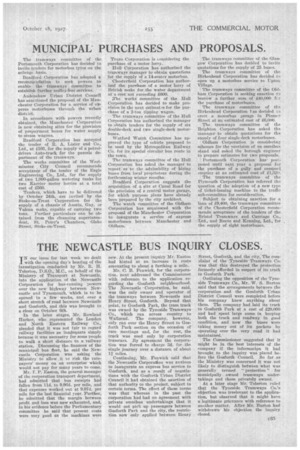THE NEWCASTLE BUS INQUIRY CLOSES.
Page 57

If you've noticed an error in this article please click here to report it so we can fix it.
TN our issue for last week we dealt
with the opening day's hearing of the investigation conducted by Mr. R. H. Tolerton, D.S.O., MC., on behalf of the Ministry of Transport at Newcastle, into the application of the Newcastle Corporation for bus-running powers over the new highway between Newcastle and Tynemouth, which is to be opened in a few weeks, and over a short stretch of road between Newcastle and Gosforth, and this was brought to a close on October 6th.
In the later stages, Mr. Rowland Harker, who represented the London and North Eastern Railway Co., pleaded that it was not fair to regard railway facilities as inadequate simply because it was necessary for some people to walk a short distance to a railway station. Discussing the finances of the municipal bus fleet, he said the Newcastle Corporation was asking the Ministry to allow it to risk the ratepayers' money on an enterprise which would not pay for many years to come.
Mr. T. P. Easton, the general manager of the corporation transport department, had admitted that bus receipts had fallen from 11.d. to 9.96d. per mile, and that expenses worked out at 9.97d. per mile for the last financial 3ear. Further, he admitted that the margin between profit and loss was now exhausted, and, in his evidence before the Parliamentary committee he said that present costs were very good as the machines were new. At the present inquiry Mr. Easton had hinted at an increase in costs amounting to about a farthing a mile.
Mr. C. 33. Fertwick, for the corporation, next addressed the Commissioner with reference to the application regarding the Gosforth neighbourhood. The Newcastle -Corporation, he said, was the only owner and operator of the tramways between Newcastle and Henry Street, Gosforth. Beyond that point, to Gosforth Park, the tram track was owned by the Tyneside Tramways Co., which ran across country to Wallsend. The company, however, only ran over the Henry Street to Gosforth Park section on the occasion of race meetings and, for the rest, the track was used only by corporation tramcars. By agreement the corporation was forced to charge 3d. for the single journey over a distance of about 11 Continuing, Mr. Fenwick said that the Newcastle Corporation was anxious to inaugurate an express bus service to Gosforth. and as a result of negotiations with the Gosforth Urban District Council it had obtained the sanction of that authority to the project, subject to certain terms. The effect of these terms was that whereas in the past the corporation had had an agreement with private omnibus undertakings that it would not pick up passengers between Gosforth Park and the city, the restriction now only applied between Henry Street, Gosforth, and the city. The complaint of the Tyneside Tramways Co: Was that this destroyed the protection formerly afforded in respect of its track to Gosforth Park; Outlining the opposition of the Tyneside Tramways Co., Mr. W. S. Burton said that the arrangements between the corporation and the Gosforth Urban District Council were completed before his company knew anything about them. The company had laid its track to Gosforth Park at a cost of £29,000 and had spent large sums in keeping both the track and roadway in good condition, and how the buses were taking money out of its pockets by operating over the very road it had maintained..
The Commissioner suggested that it might be in the best interests of the company if the information it had brought to the inquiry was placed before the Gosforth Council. So far as the Ministry was concerned it was not likely to distinguish between what was generally termed " protection " for municipally owned tramways undertakings and those privately owned.
At a later stage Mr. Tolerton ruled that the Tyneside Tramways Co.'s objection was irrelevant to the application, but observed that it might have a legitimate grievance with reference to another matter. After Mr. Burton had withdrawn his objection the inquiry closed.












































































































